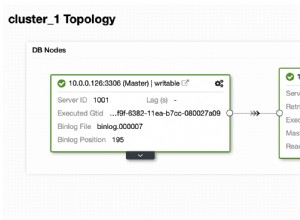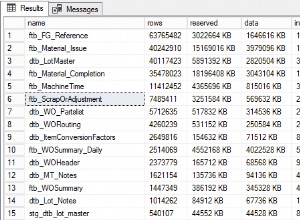Ich würde dies etwas anders machen, indem ich sowohl den UNPIVOT anwende und der PIVOT Funktionen, um das Endergebnis zu erhalten. Das Unpivot nimmt die Werte sowohl von totalcount und totalamount Spalten und platziert sie in einer Spalte mit mehreren Zeilen. Sie können dann nach diesen Ergebnissen schwenken.:
select chardate,
Australia_totalcount as [Australia # of Transactions],
Australia_totalamount as [Australia Total $ Amount],
Austria_totalcount as [Austria # of Transactions],
Austria_totalamount as [Austria Total $ Amount]
from
(
select
numericmonth,
chardate,
country +'_'+col col,
value
from
(
select numericmonth,
country,
chardate,
cast(totalcount as numeric(10, 2)) totalcount,
cast(totalamount as numeric(10, 2)) totalamount
from mytransactions
) src
unpivot
(
value
for col in (totalcount, totalamount)
) unpiv
) s
pivot
(
sum(value)
for col in (Australia_totalcount, Australia_totalamount,
Austria_totalcount, Austria_totalamount)
) piv
order by numericmonth
Siehe SQL-Fiddle mit Demo.
Wenn Sie eine unbekannte Nummer von country haben Namen, dann können Sie dynamisches SQL verwenden:
DECLARE @cols AS NVARCHAR(MAX),
@colsName AS NVARCHAR(MAX),
@query AS NVARCHAR(MAX)
select @cols = STUFF((SELECT distinct ',' + QUOTENAME(country +'_'+c.col)
from mytransactions
cross apply
(
select 'TotalCount' col
union all
select 'TotalAmount'
) c
FOR XML PATH(''), TYPE
).value('.', 'NVARCHAR(MAX)')
,1,1,'')
select @colsName
= STUFF((SELECT distinct ', ' + QUOTENAME(country +'_'+c.col)
+' as ['
+ country + case when c.col = 'TotalCount' then ' # of Transactions]' else 'Total $ Amount]' end
from mytransactions
cross apply
(
select 'TotalCount' col
union all
select 'TotalAmount'
) c
FOR XML PATH(''), TYPE
).value('.', 'NVARCHAR(MAX)')
,1,1,'')
set @query
= 'SELECT chardate, ' + @colsName + '
from
(
select
numericmonth,
chardate,
country +''_''+col col,
value
from
(
select numericmonth,
country,
chardate,
cast(totalcount as numeric(10, 2)) totalcount,
cast(totalamount as numeric(10, 2)) totalamount
from mytransactions
) src
unpivot
(
value
for col in (totalcount, totalamount)
) unpiv
) s
pivot
(
sum(value)
for col in (' + @cols + ')
) p
order by numericmonth'
execute(@query)
Siehe SQL Fiddle mit Demo
Beide liefern das Ergebnis:
| CHARDATE | AUSTRALIA # OF TRANSACTIONS | AUSTRALIA TOTAL $ AMOUNT | AUSTRIA # OF TRANSACTIONS | AUSTRIA TOTAL $ AMOUNT |
--------------------------------------------------------------------------------------------------------------------------------------
| Jul-12 | 36 | 699.96 | 11 | 257.82 |
| Aug-12 | 44 | 1368.71 | 5 | 126.55 |
| Sep-12 | 52 | 1161.33 | 7 | 92.11 |
| Oct-12 | 50 | 1099.84 | 12 | 103.56 |
| Nov-12 | 38 | 1078.94 | 21 | 377.68 |
| Dec-12 | 63 | 1668.23 | 3 | 14.35 |




